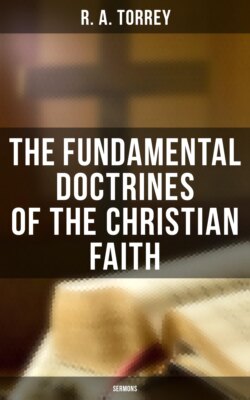Читать книгу The Fundamental Doctrines of the Christian Faith (Sermons) - R. A. Torrey - Страница 15
На сайте Литреса книга снята с продажи.
II. GOD IS A PERSON
ОглавлениеTable of Contents
The next thing that the Bible teaches about God is that God is a person. That is to say He is a being who knows, feels, loves, hears prayer, speaks, acts, a being who acts intelligently upon us and upon whom we can act.
While God is in all things, He is a personality distinct from the persons and things in which He is, which He has created. The Bible, both in the Old and New Testaments is full of this vital conception of "a living God" as distinguished from the mere cold abstraction of "The Absolute," or "The Infinite," or "The Supreme Being," or "The Great First Cause" of which "Modern Philosophy" loves to prate. For example, we read in Jer. 10:10-16: "But Jehovah is the true God; he is the living God, and an everlasting king: at his wrath the earth trembleth, and the nations are not able to abide his indignation. (11) Thus shall ye say unto them, the gods that have not made the heaven and the earth, these shall perish from the earth, and from under the heavens. (12) He hath made the earth by his power, he hath established the world by his wisdom, and by his understanding hath he stretched out the heavens. (13) When he uttereth his voice, there is a tumult of waters in the heavens, and he causeth the vapours to ascend from the ends of the earth; he maketh lightnings for the rain, and bringeth forth the wind out of his treasuries. (14) Every man is become brutish and is without knowledge; every goldsmith is put to shame by his graven image; for his molten image is falsehood, and there is no breath in them. (15) They are vanity, a work of delusion; in the time of their visitation they shall perish. (16) The portion of Jacob is not like these; for he is the former of all things; and Israel is the tribe of his inheritance: Jehovah of hosts is his name." In this passage God is distinguished from idols which are things and not persons, things which "speak not" "cannot act," "cannot do good neither is it in them to do evil"; and we are told that Jehovah is wiser than "all the wise men." Is "the living God," "an everlasting King," a being who hath "wrath and indignation," separate from His creatures—"at His wrath the earth trembleth and the nations are not able to abide His indignation."
In Acts 14:15 we read: "Sirs, why do ye these things? We also are men of like passions with you, and bring you good tidings, that ye should turn from these things unto the living God, who made heaven and earth and sea, and all that in them is." Here also we have the representation of God as a personal being distinct from His created work, and also to be clearly distinguished from the idols which are not living gods. In 1 Thess. 1:9, the converts at Thessalonica are represented as turning from dead gods, "idols, to serve the living and true God."
In 2 Chron. 16:9 we are told that "The eyes of Jehovah run to and fro throughout the whole earth, to show himself strong in the behalf of them whose heart is perfect toward him," and in Ps. 94:9, 10 we read: "He that planteth the ear, shall he not hear? He that formed the eye, shall he not see? He that punisheth nations, shall not he correct? Even he that teacheth men knowledge?" This is clearly the representation of a personal God and not a mere abstraction like "The Absolute," or "The Infinite," or "The Supreme Being." The clear distinction between God, who is immanent in all things, and dwells in believers, and the beings and persons in whom He dwells, is brought out very clearly by our Lord Himself in John 14:10: "Believest thou not that I am in the Father and the Father in me? The words that I say unto you I speak not from myself: But the Father abiding in me doeth his work." And again in the 24th verse of the same chapter where our Lord Jesus distinguishes between His own personality and that of the Father, who dwelt in Him, in these words: "He that loveth me not keepeth not my words: and the word which ye hear is not mine, but the Father's who sent me." This conception of God pervades the entire Bible. The view of God presented in the Bible is utterly different from the conception of Pantheism and Buddhism and Theosophy and Christian Science. This conception is found in the opening words of the Bible, Gen. 1:1: "In the beginning God created the heaven and the earth." Here the God of the Bible is clearly differentiated from the so-called God of Pantheism, and the God of Christian Science. And this same conception of God is found in the last chapter of the Bible, and it is found in every chapter of the Bible between the first and the last. The God of the Bible is a Personal Being Who, while He created all things and is in all things, is a distinct personality separate from the persons and things He has created.
